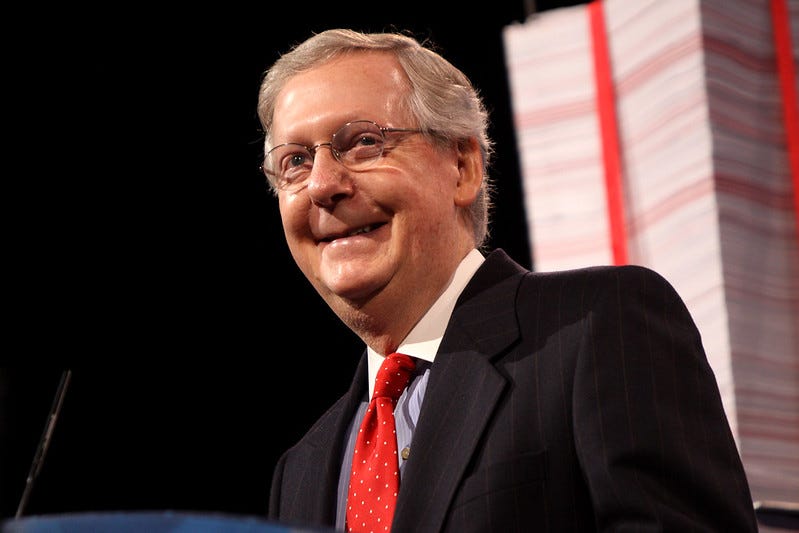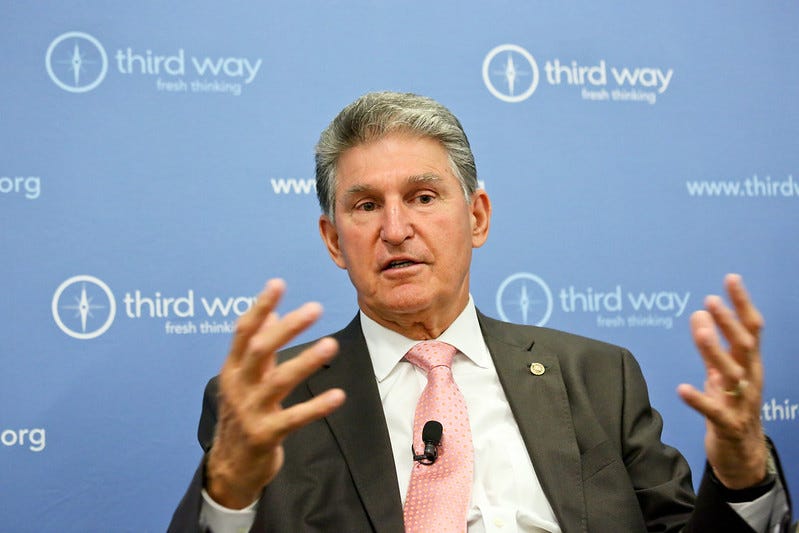Wake Up To Politics - July 14, 2022
Wake Up To Politics: Will Democrats finally “Build Back Manchin”?
by Gabe Fleisher
Good morning! It’s Thursday, July 14, 2022. Election Day 2022 is 117 days away. Election Day 2024 is 845 days away.
In today’s packed newsletter: A look at the latest Democratic efforts to pass a major fiscal package this month. Plus: what you should know about Biden’s trip to the Mideast, other top headlines of the day, a zoomed-out look at some bigger trends, and — of course — a glance at the day ahead in Washinogtn.
Thanks so much for Waking Up to Politics.
Explainer: Will Democrats be able to pass a new spending package?
The Labor Department’s latest Consumer Price Index report, released on Wednesday, showed prices rose 9.1% higher in June compared to the year before, the sharpest inflationary increase since December 1981. Much of that surge was driven by energy prices, which were nearly 60% higher than last year.
Those numbers are bad news for Democrats’ electoral prospects, of course — voters already give President Biden dismal marks for his handling of the economy — but they also could throw a wrench into the party’s hopes of passing a major tax-and-spending package along party lines this month.
What’s the connection? Sen. Joe Manchin (D-WV), always the key holdout for Democrats, warned Wednesday that before supporting the package, he’d have to be sure that “everything” in it would be guaranteed not to further exacerbate inflation.
Manchin, like 70% of Americans, believes Covid-era government spending contributed to the current inflation and has been hesitant to back legislation that would lead to pricing raising further; he tanked the current package’s predecessor, the Build Back Better Act, last year partly due to those concerns.
“No matter what spending aspirations some in Congress may have, it is clear to anyone who visits a grocery store or a gas station that we cannot add any more fuel to this inflation fire,” Manchin said in a statement after Wednesday’s report. All 50 Democrats would need to sign off on the package for it to pass the evenly-divided Senate.
What might Manchin support? The West Virginia centrist reiterated on Wednesday that he was ready to back the Democratic plan, released last week, that would allow Medicare to negotiate with companies on prescription drug prices, in order to lower costs for consumers and government health care programs alike.
Manchin has also offered support for a plan that would raise taxes on high earners in order to extend the solvency of Medicare. But those are the only two provisions that are known to have his approval.
Democrats are also desperate to include something to combat climate change in the package, with discussions centering around a penalty for producers of methane gas, which contributes to warming the planet. Per the Washington Post, the Biden administration is considering approving new oil drilling on public lands (a Manchin goal) in exchange for the senator’s support of the methane penalties — a trade that violates Biden’s campaign rhetoric but climate advocates say would be a net-win for the environment.
A proposal to extend enhanced Obamacare subidies is also on the table as part of what will likely be a $1 trillion package, which will be much smaller than the $3.5 trillion “Build Back Better” plan and likely devoid of its spending on education, family leave, public housing, and the child tax credit.
Why are the talks so urgent? Because Democrats’ ability to pass such a filibuster-proof package will expire on September 30, when the budget resolution that allows them to use the reconciliation process lapses.
Senate Majority Leader Chuck Schumer (D-NY) hopes to have the package on the floor by the chamber’s upcoming recess, which is set to begin on August 8. That’s precious little time to push through a package that remains largely unwritten. Further complicating the timeline: Schumer currently has Covid, meaning he is negotiating with Manchin over Zoom from his house in Brooklyn.

Are there other wrinkles? As always, Democrats have just about no margin for error — not just in the 50-50 Senate, but in the House as well, where the package could survive only four defections.
Some moderate House Democrats are already threatening to oppose the legislation if it includes new tax increases, a view Sen. Kyrsten Sinema (D-AZ) has echoed in the past. That is in stark contrast to Manchin, who has insisted the package raise taxes on the wealthy in order to bring down the deficit and combat inflation.
Senate Minority Leader Mitch McConnell (R-KY) has thrown another wrench in the mix: he says that if Democrats move forward with a reconciliation package, Republicans will vote against the bipartisan U.S. Innovation and Competition Act (USICA).
Different versions of USICA, a measure aimed at enhancing America’s competitiveness with China and addressing the semiconductor ship shortage, have passed the House and Senate; the two chambers are currently engaged in a conference committee to settle their differences. Passing the package is another one of Democrats’ top priorities before the midterms.
A potential compromise is beginning to emerge, however: McConnell has signaled openness to passing a key provision of USICA — $52 billion in funding for domestic semiconductor manufacturers — as a stand-alone bill. Democrats are reportedly warming to the idea.
U.S. factories currently make exactly zero of the most advanced category of semiconductors, which are used to produce everything from smartphones to pivotal military technology.
Catch up quick: What to know about Biden’s Mideast trip
President Biden is on his first trip to the Middle East since taking office. Here’s a quick rundown on what you should know:
The most controversial — and high-stakes — leg of the trip will begin on Friday, when Biden travels to Saudi Arabia. The president’s visit there is a 180-degree turnaround from his promise on the campaign trail to treat the Saudis as “the pariah that they are” for their human rights violations, most notably the 2018 assassination of Washington Post journalist Jamal Khashoggi.
Why the sudden about-face? To answer that question, look no further than the meter at your local gas station. Biden is expected to urge the Saudis to increase their oil production, as part of an effort to increase the global supply and hopefully drive down gas prices at home. The president’s push will include meetings with Crown Prince Mohammed bin Salman (known as MBS), who ordered Khashoggi’s killing, a move that has earned him criticism from Democratic and Republican lawmakers alike.
Saudi Arabia is also key to the other main objective of Biden’s voyage: creating stronger ties between Israel and its Arab neighbors. Here, the president is building off of the successes of his predecessor, former President Donald Trump, whose Abraham Accords brokered relationships between Israel and four Arab nations (Bahrain, the United Arab Emirates, Morocco, and Sudan).

Israel has developed some security ties with Saudi Arabia, but the countries do not have formal relations. The Saudis boast the largest economy in the Middle East, so fostering official ties with the kingdom would be a major coup for Israel, as well as for its biggest ally, the U.S.
Don’t expect major announcements on either front this week. Saudi Arabia is not expected to suddenly announce an increase in oil production or an alliance with Israel in the next few days.
Instead, Biden’s aim with the trip is — despite the significant human rights concerns — more to smooth over relations with MBS and other Saudi leaders, in hopes of one day securing those broader goals.
In the interim, the journey is expected to yield some more limited progress, such as an expected deal to begin allowing direct flights between Saudi Arabia and Israel and possible movement towards an air-defense alliance against Iran.
More news to know
January 6th probe: Per CNN and NBC News, the January 6h committee witness who former President Trump recently tried to call was a member of the White House support staff — someone who he would not normally be in contact with, and who is in a position to corroborate parts of Cassidy Hutchinson’s bombshell testimony.
The committee learned of the contact from the witnesses’ lawyer and referred the matter to the Justice Department to probe as a possible attempt at witness tampering.
Covid: The FDA authorized the nation’s fourth Covid-19 vaccine on Wednesday, a shot developed by the Maryland company Novavax. Public health officials hope the new shot will attract some Americans who are suspicious of mRNA technology, which Novavax did not use in making its vaccine.
Abortion: White House officials are actively debating whether to formally declare a public health emergency involving access to abortion, according to the Washington Post.
Big picture: Trends to watch
We live in an era of shifts. Here are four bigger-picture dynamics worth paying attention to, all based on data that’s come out in the last few days...
Population shift: The United Nations projects that the global population will reach 8 billion by November, and that India will surpass China as the world’s most populous country by 2023.
Electoral shift: For the first time, a New York Times poll found Democrats had a larger share of support among white college graduates than among non-white voters, evidence of a transformation in the party’s coalition.
Monetary shift: The U.S. dollar and the euro are equal in value for the first time in two decades.
Industrial shift: The construction of new manufacturing facilities in the U.S. has shot up 116% over the past year, per Bloomberg, after years of factories shuttering across the country.

What’s going on in politics today
All times Eastern.
President Biden is in Jerusalem, Israel. Earlier this morning, he:
Met with Israeli prime minister Yair Lapid and held a press conference with him.
Held a hybrid meeting with the leaders of Israel, India, and the United Arab Emirates — the other members of a new four-country bloc dubbed the “I2U2.”
Later today, he will:
Meet with Israeli president Isaac Herzog (9:45 am).
Meet with Israeli opposition leader Benjamin Netanyahu, the former — and possibly future — prime minister (10:20 am).
Receive Israel’s highest civilian medal, the Presidential Medal of Honor, from Herzog (11:20 am).
Meet with U.S. athletes and view the opening ceremonies of the Maccabiah Games, the third-largest international sporting event in the world, which is held quadrennially in Israel (12:45 pm).
Vice President Kamala Harris will travel to Florida today. She will:
Deliver remarks at a national meeting of Alpha Kappa Alpha, her sorority, in Orlando (11:30 am).
Hold a roundtable in Orlando with state legislative leaders on reproductive rights (1:50 pm).
Meet with service members at MacDill Air Force Base in Tampa (5:05 pm).
Receive a briefing from the chiefs of U.S. Central Command (CENTCOM) and U.S. Special Operations Command (SOCOM), which are both headquartered at MacDill (5:55 pm).
Tour the CENTCOM Joint Operations Center (6:55 pm).
Return to Washington, D.C. (7:35 pm).
First Lady Jill Biden will travel to Massachusetts today. She will:
Visit military families at Home Base, a Boston organization that provides free clinical and wellness care to service members and their families, as part of her “Joining Forces” initiative (2:45 pm).
Attend a Democratic National Committee (DNC) fundraiser in Andover (4:45 pm).

The Senate will convene (10 am) and vote to:
Confirm the nomination of Kate Heinzelman to be General Counsel of the CIA (11:45 am).
Advance the nomination of Michelle Childs to be a U.S. Circuit Judge for the D.C. Circuit (1:45 pm). Because of its role adjudicating disputes involving federal agencies, the D.C. Circuit is known as the nation’s second-most powerful court — one step down from the Supreme Court, which Biden considered nominating Childs to earlier this year.
The House will convene (10 am) and continue voting on the 650 amendments offered to H.R. 7900, the National Defense Authorization Act for Fiscal Year 2023, which is the annual package setting the policies and budget of the Department of Defense.
Congressional leaders will hold a ceremony honoring Woody Williams, who was the last surviving Medal of Honor recipient from World War II until dying last month (11 am).
Williams, who became a prominent advocate for veterans and their families, will lie in honor at the Capitol throughout the day, a very rare tribute.
Later, House Speaker Nancy Pelosi will hold her weekly press conference (1 pm).
Congressional committee hearings will include a House Judiciary hearing on “the threat to individual freedoms in a post-Roe world” (9 am).
The Supreme Court is out until October.
Links to watch for yourself: Senate session • House session • Pelosi presser • House Judiciary hearing
That’s it for today. If you enjoy Wake Up To Politics, it’s always appreciated if you donate to support the newsletter or buy some merch. Or if you tell your friends and family to sign up at wakeuptopolitics.com.
If you have any questions or feedback, feel free to email me: my inbox is always open.
Thanks for waking up to politics! Have a great day.
— Gabe






